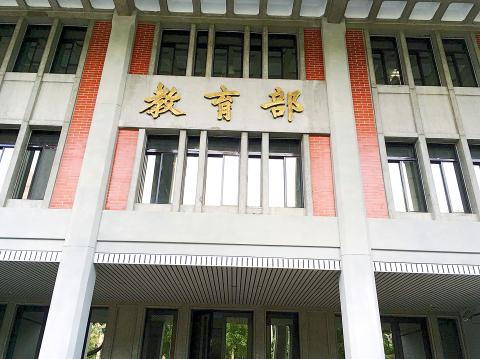Education groups yesterday expressed concern over new curriculum guidelines scheduled to take effect in August after deputy education ministers Yao Leeh-ter (姚立德) and Fan Sun-lu (范巽綠) resigned.
Yao served as acting education minister three times between April last year and earlier this month, following the resignation of former education ministers Pan Wen-chung (潘文忠), Wu Maw-kuen (吳茂昆) and Yeh Jiunn-rong (葉俊榮) — the first time anyone has been an acting education minister three times within nine months.
He is reportedly planning to return to teaching at National Taipei University of Technology.

Photo: Rachel Lin , Taipei Times
Fan served as deputy education minister for a little more than three months after taking office in September last year.
New Cabinet members are to be sworn in today and the ministry has planned a farewell party for Yao and Fan in the afternoon.
Yao was responsible for overseeing higher education and vocational schools, while Fan handled compulsory education.
Their departure would require others to take over their work at the ministry.
Among high-level officials, Deputy Minister of Education Lin Teng-chiao (林騰蛟) is the only one to have overseen compulsory education, as he has served as deputy commissioner of the Taipei’s Department of Education and as the commissioner of the New Taipei City Department of Education.
He has also served as the director of the ministry’s Department of Technological and Vocational Education.
Although K12 Education Administration Director-General Peng Fu-yuan (彭富源) has served as the commissioner of the Taichung Department of Education, he is less familiar with the new curriculum guidelines and was not appointed director-general until Dec. 24.
The National Academy for Educational Research, which manages affairs related to curriculum guidelines, has been without a formal president since July last year, with its vice president, Kung-Bin Kuo (郭工賓), doubling as its acting president.
“Compared with the other ministries, the Ministry of Education [MOE] is the least stable one, having had three ministers in one year,” National Parent Education Volunteer Association director-general Wu Fu-pin (吳褔濱) said.
The new curriculum guidelines are an important policy, yet there would be no senior official familiar with them to help the new minister with their implementation, he said, adding that the situation is “deeply worrying.”
To ensure a smooth transition for schools and students, Wu urged the government to abandon its practice of appointing officials from its inner circle and look for talent to fill in the positions left by Yao and Fan.
Separately, Shih Chien University president Michael Chen (陳振貴) on Saturday said the new education minister would face a series of challenges when implementing the new curriculum guidelines.
The ministry must also deal with the transformation of private universities and colleges, as a steep decline in enrollments is expected next year due to the nation’s dwindling birthrate, he added.
Legislation would be needed to provide the legal basis for schools undergoing transformation to prevent problems, Chen said.
The ministry must work on boosting universities’ global competitiveness, he said, adding that it should increase schools’ research funding to improve their ranking and help them train more talent.
Additional reporting by Wu Po-hsuan

Chinese Nationalist Party (KMT) Chairman Eric Chu (朱立倫), spokeswoman Yang Chih-yu (楊智伃) and Legislator Hsieh Lung-chieh (謝龍介) would be summoned by police for questioning for leading an illegal assembly on Thursday evening last week, Minister of the Interior Liu Shyh-fang (劉世芳) said today. The three KMT officials led an assembly outside the Taipei City Prosecutors’ Office, a restricted area where public assembly is not allowed, protesting the questioning of several KMT staff and searches of KMT headquarters and offices in a recall petition forgery case. Chu, Yang and Hsieh are all suspected of contravening the Assembly and Parade Act (集會遊行法) by holding

PRAISE: Japanese visitor Takashi Kubota said the Taiwanese temple architecture images showcased in the AI Art Gallery were the most impressive displays he saw Taiwan does not have an official pavilion at the World Expo in Osaka, Japan, because of its diplomatic predicament, but the government-backed Tech World pavilion is drawing interest with its unique recreations of works by Taiwanese artists. The pavilion features an artificial intelligence (AI)-based art gallery showcasing works of famous Taiwanese artists from the Japanese colonial period using innovative technologies. Among its main simulated displays are Eastern gouache paintings by Chen Chin (陳進), Lin Yu-shan (林玉山) and Kuo Hsueh-hu (郭雪湖), who were the three young Taiwanese painters selected for the East Asian Painting exhibition in 1927. Gouache is a water-based

Taiwan would welcome the return of Honduras as a diplomatic ally if its next president decides to make such a move, Minister of Foreign Affairs Lin Chia-lung (林佳龍) said yesterday. “Of course, we would welcome Honduras if they want to restore diplomatic ties with Taiwan after their elections,” Lin said at a meeting of the legislature’s Foreign Affairs and National Defense Committee, when asked to comment on statements made by two of the three Honduran presidential candidates during the presidential campaign in the Central American country. Taiwan is paying close attention to the region as a whole in the wake of a

OFF-TARGET: More than 30,000 participants were expected to take part in the Games next month, but only 6,550 foreign and 19,400 Taiwanese athletes have registered Taipei city councilors yesterday blasted the organizers of next month’s World Masters Games over sudden timetable and venue changes, which they said have caused thousands of participants to back out of the international sporting event, among other organizational issues. They also cited visa delays and political interference by China as reasons many foreign athletes are requesting refunds for the event, to be held from May 17 to 30. Jointly organized by the Taipei and New Taipei City governments, the games have been rocked by numerous controversies since preparations began in 2020. Taipei City Councilor Lin Yen-feng (林延鳳) said yesterday that new measures by